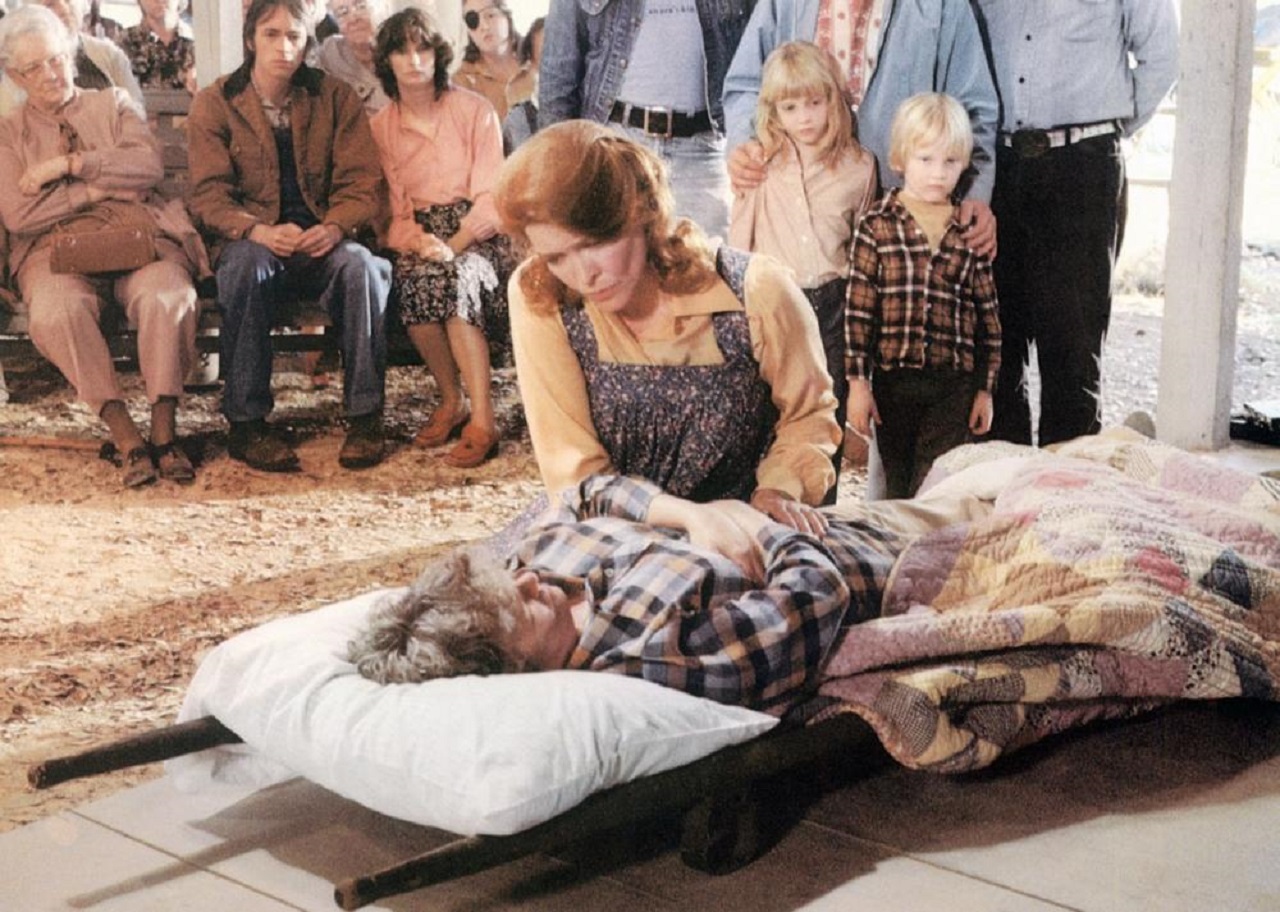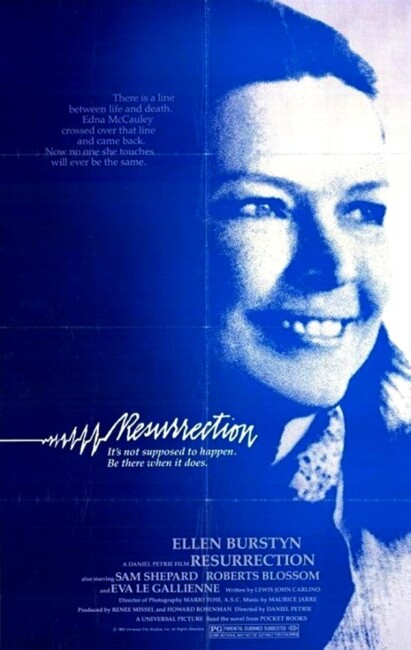Crew
Director – Daniel Petrie, Screenplay – Lewis John Carlino, Producers – Renee Missel & Howard Rosenman, Photography – Mario Tosi, Music – Maurice Jarre, Visual Effects – Richard & Robert Greenberg & Tony Silver, Special Effects Supervisor – Nick Carey, Makeup – Tom Burman & William Tuttle, Production Design – Paul Sylbert. Production Company – Universal.
Cast
Ellen Burstyn (Edna Mae McCauley), Sam Shepard (Cal Carpenter), Roberts Blossom (John Harper), Eva Le Galliene (Grandma Pearl), Jeffrey DeMunn (Joe McCauley)
Plot
Injured in a car crash, Edna Mae McCauley has an out-of-body experience where she sees faces from her past trying to guide her into the hereafter. Instead, she returns to life. Soon after she discovers that she now has the power to heal. Back in the Mid-Western town of her childhood, she begins a faith-healing mission and tries to use her powers for good. However, she must also deal with the condemnation of fundamentalists and a boyfriend who becomes religiously crazed and tries to kill her.
Out-of-the-body (OOBE) afterlife experiences and faith healing emerged as a major part of the 1970s kit bag of Me Generation mysticism. A number of studies and claims were made and books published as to their scientific validity during this time. Resurrection was a serious attempt to deal with the subject and came presented with the polish of a studio film.
Ellen Burstyn – who it should be noted also appeared dealing with the opposite end of the religious spectrum in The Exorcist (1973) – gives an open and convincing performance in the central role. Equally, the film maintains a low key and pleasant tone. Yet for all its patent earnestness it never really convinces. A carefully ecumenical tone is taken throughout as though the film were too afraid of coming down on any one side. Even though it goes so far as to make fundamentalist crazies the villains of the film, it still has a distinctly Southern Baptist tone – albeit a liberal and open-armed one where everybody is eventually forgiven and accepted. Indeed, it is so forgiving it ultimately cannot construe any motivation for Sam Shepard’s villain of the piece – one minute he is a cocky, cynical redneck, the next he has inexplicably gone moody, unable to handle the relationship with Ellen Burstyn and is reading his Bible, calling her the Anti-Christ and readying his shotgun.
For all the film’s wish to show bonafide miracle healing, the actual healing scenes themselves are played with surprisingly little conviction. The film is, if anything, more convincing in Ellen Burstyn’s pleas that she does not know where her power is coming from – like the explanation she offers up as to why some people are healed and others are not: “Some people need their sickness to get love and attention. Other people need it to give. It is not up to me to judge the right or wrong of that.”

The one healing scene that does hold some persuasion is the one where she attempts to heal her own crippled leg and the physical exertion she undergoes is seen in the remarkable image of a poker being psychically bent under the strain in the background of a shot.
The film peters out to an irritating non-ending. The way the film is told, as a gentle and flowing observation of life through a misty modern Mid-West lens, it has no suitable climax for it to work up to, for this wrings the drama out of it. Ultimately, it is an approach that leaves the film with the feeling that it should have great significance. However, it is a film that has only played with emotionally affecting you but ended up going away without having found anything to say about its subject. If anything, the good old fashioned melodramatic approach to the subject that the film assiduously avoids would have made for a more satisfying film.
Canadian born director Daniel Petrie had a long history working in television, back to the days of live broadcast tv in he 1950s and through classic works like the mini-series Sybil (1976). He gained attention as a director with A Rain in the Sun (1951) and made other works over the years including The Betsy (1978) and Fort Apache The Bronx (1979). His other genre works include:- the werewolf tv movie Moon of the Wolf (1972), the underwater exploration film The Neptune Factor: An Undersea Odyssey (1973) and Cocoon: The Return (1988).

